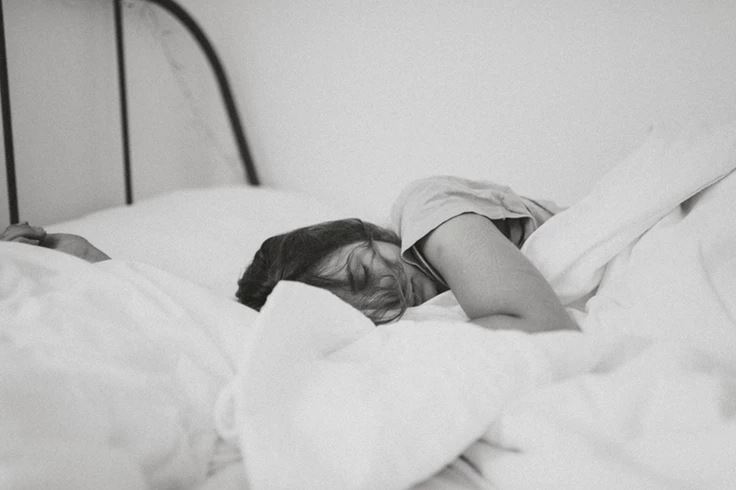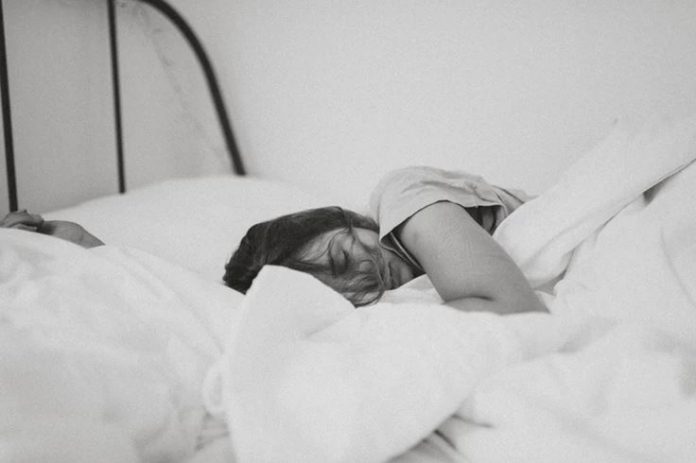The 2010s were the decade of no sleep, it seemed, with many people in the first world seeming to report getting less sleep than usual. We’re now the people who swear by energy drinks, and we sometimes find ourselves up at 3 AM clicking the “random” button on Wikipedia. We hear phrases like “I’ll sleep when I’m dead,” and “Sleep is for the weak.”
However, having the right amount of sleep is needed for physical, mental, and emotional health. We’ll tell you why people need sleep, why you may have trouble not sleeping, and ways you can fall asleep.

The Problem With Not Getting Sleep
You probably know that not resting isn’t good for your health. If you’ve ever had to pull an all-nighter, or you had a bad night, you know how sluggish you felt the next day. An occasional bad night isn’t going to kill you and is nothing to, pun not intended, lose sleep over, but if you’re dealing with chronic insomnia, long-term sleep deprivation can lead to health problems.
You can’t die from literally not sleeping; humans have gone for days without sleeping, but chronic sleep deprivation can lead to tiredness, not being able to focus, being more accident-prone, irritability, and you’re at risk for conditions such as stroke, heart attack, diabetes, and other physical and mental health problems.
How Much Sleep Do You Need?
This is an interesting one, because you may find different answers. Most say 7-9. Some sources may be a little more generous and tell you 6 or 6.5 is the minimum. Other sources say you need at least 10 hours or some number which is difficult for most adults to accomplish. Some will tell you that older adults need less, and others say they need the same.
It’s all so confusing. A good rule of thumb is to stick to the 7-9. If you get a little less or a little more, no big deal. Some people need less naturally, while others need more. Knowing what amount lets you personally wake up feeling refreshed is the best move.
Can You Catch Up?
There are some people who spend the weekdays up and not getting much and then catching up during the weekend. There’s the concept of sleep debt, where every hour of sleep you miss is something you need to “pay off” later on.
However, the science is mixed. Some studies say that making up that sleep is useless, while others say that it may help, but you need a little more than just a weekend.
The best bet is to try to get an adequate amount of sleep every night, and don’t play catch-up when possible. In all parts of life, procrastination is bad.
What About Naps?
This is another part of sleep where you may find contradicting information. Some will tell you that a nap, especially a shorter or power nap, can help you. Others will say that it just disrupts your sleep and makes it worse and that you should try it during your bedtime.
Again, this may be situational. Try napping, and if it works, great. If not, avoid napping whenever you can.
Why You May Have a Hard Time Not Sleeping
Our brains are an oddity. You would think that when it’s time to sleep, you could just close your eyes and enter the world of dreams. But for many, this doesn’t happen. Racing thoughts can occur, or you may feel sleepy, but can’t sleep. Here are a few reasons why this may be the case.
Poor Sleep Hygiene
Good, personal hygiene is important, and this includes the sleep department. Sleep hygiene consists of practices to help prepare your body for sleep. Here are a few examples:
- Sleeping in a dark room. If you are sleeping during daylight, having blackout curtains can help.
- Unwinding before bed. Taking a hot bath, listening to some relaxing music, drinking herbal tea, or doing whatever it is that makes you tired can improve your chances of going to bed.
- Using your bed only for sleep or sex. If you are always in your bed, you may associate it with being active.
- Being consistent with your sleep schedule. Going to bed and waking up at the same time is known as a circadian rhythm, and when you’re being inconsistent, it can be hard to sleep.
- Not having the best pillows or sheets. Try buying pillows for your sleeping positions or buy some weighted blankets to help you get more sleep.
- Not exercising. While exercising too close to bed may keep you up, doing it during another part of the day can lead to better sleep. Whether you’re running, biking, lifting weights, or even walking, it helps.
One big cause of poor sleep is blue light exposure. Blue light comes from the sun naturally, and from your screens as well. This destroys melatonin, a chemical that helps regulate sleep. With smartphones, many people are staring into something that is destroying their ability to sleep.
Many phones are equipped with blue light filters or night modes to offset their effects. But even then, going on Facebook or Twitter before bed isn’t a good move. The notifications can stimulate you. You may read something that triggers your emotions and makes it harder to sleep. Putting the phone away an hour or so before bed may help.
This isn’t to say that all screens are bad. If you have a TV with no blue light, watching a relaxing documentary or other show may help you unwind. Plenty of people have fallen asleep to their favorite movie or show, for example.
Check also: 8 Technologies that Help You Sleep Better
Staying in Bed
Another mistake people make is staying in bed when they can’t sleep, thinking sleep will come. Your mind may unconsciously associate your bed with a lack of sleep.
If you can’t fall asleep after 20-30 minutes, why not get out of bed for a bit? Do something relaxing, and once you feel ready, go back to bed. Maybe you can learn some meditation to clear out your mind or listen to ambient sound while doodling. Repeat the process if you still can’t sleep.
You’re Tired, Not Sleepy
Some people mistake being tired for sleepy and may use the two terms interchangeably. However, there is a difference. Being tired is when you’re low on energy and you can’t focus. When you’re sleepy, you yawn, have trouble keeping your eyes open, and feel ready for bed. Being tired means you’re less likely to fall asleep, and vice versa.
Don’t Overthink It
Insomnia is a tough cycle to break because you’re often worried about not getting sleep. You may find yourself reading articles like this one, reading about the health effects of not getting enough sleep, and worrying about yourself when you go to bed.
Sometimes, the solution is to not think about sleep at all, and it will naturally come to you.
Don’t Be Afraid to Seek Help
Improving your sleep hygiene, getting on a better sleep schedule, and sleeping when you’re sleepy are great ways to improve your overall sleep help, but sometimes, you may need even more help. In this case, there is no shame in seeking help if you need it. A doctor may give you medication to help you sleep. Don’t feel bad if you have to take it; it’s not much different than taking something to wake you up.
Meanwhile, a therapist or a counselor can teach you more ways to fall asleep, and help you keep a sleep diary so you can identify possible triggers and causes for your insomnia.
We hope that you get a better night’s sleep. Good night.










































